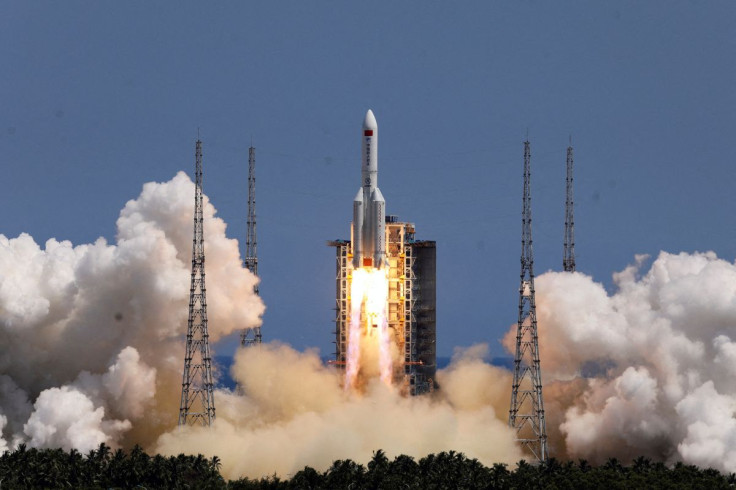Chinese Coast Guard 'Forcefully' Seizes Space Debris From Philippine Navy In South China Sea
KEY POINTS
- Chinese Coast Guard cut the towing line of the Philippine naval vessel carrying space debris
- Residents of the island close to where the incident occurred heard blasts a few hours later
- Incident occurred just hours before U.S. VP Kamala Harris arrived in the Philippines for talks
Amid tensions in the Indo-Pacific, China has again been accused of provocation in the South China Sea as its coast guard blocked and "forcefully" seized space debris towed by a Philippine naval vessel.
In the incident that occurred Sunday, Philippine sailors reportedly spotted unidentified "metallic" floating objects through a long-range camera, drifting in strong waves near the Philippine-controlled Thitu island, also known as Pag-asa.
As the Philippine navy towed the debris back, a Chinese Coast Guard ship, bearing bow number 5203 approached the location and "blocked their pre-plotted course twice," reports quoting Vice Admiral Alberto Carlos of the Philippine Navy said.
Here is the Chinese Coast Guard vessel that got involved. Not a tiny one. pic.twitter.com/GCJ3up800U
— inteldoge@masto.ai (@IntelDoge) November 21, 2022
The Chinese boat then "forcefully retrieved" the object by cutting the towing line attached to the Philippines' rubber boat. No shots were fired during the incident and no injuries have been reported.
Meanwhile, Major Cherryl Tindog, a spokesperson for the Philippines military's western command, was quoted as saying that the floating metal object appeared similar to other pieces of Chinese rocket debris found in Philippine waters recently.
"We practise maximum tolerance in such a situation," Tindog said. "Since it involved an unidentified object and not a matter of life and death, our team just decided to return."
Reports say the debris was likely to be parts of China's Long March 5B rocket, which blasted off earlier in November from the Wenchang Space Launch Center on Hainan island, located just over 621 miles from where the latest debris has been found.
Beijing, while confirming that it was part of its rocket debris, denied that there was a forcible seizure and said that debris was handed over by Philippine forces after a "friendly negotiation."
According to Reuters, China's foreign ministry spokesperson Mao Ning told the press Monday that the object was debris from a Chinese rocket's payload fairing - casing that protects the nose-cone of a spacecraft.
"People from the Philippines side salvaged and towed the floating object first. After both sides had a friendly negotiation at the scene, the Philippines handed over the floating object to us," Mao said.
"It was not a situation in which we waylaid and grabbed the object," she added.
The Philippine-controlled Thitu island close to where the alleged confrontation occurred, is part of the highly contested Spratly Islands over which tensions between Manila and Beijing have escalated in recent years.
The Philippines government had in April 2019 filed a diplomatic protest with Beijing after hundreds of Chinese ships and boats were spotted around the island. While China claimed they were fishing boats merely sheltering from bad weather, the Philippines said the vessels were manned by militia.
A few hours after the encounter between the Philippine Navy and China Coast Guard, a series of blasts was heard by residents of the island which, according to a report in the Inquirer, came from artillery firing in the Chinese man-made island on Zamora (Subi) Reef located about 16 miles away.
Significantly, the incident occurred just hours before US vice-president Kamala Harris arrived in the Philippines for talks with president Ferdinand Marcos Jr, as both countries discussed ways to strengthen their security alliance. Speaking ahead of their meeting Monday, Harris said the U.S. had an "unwavering commitment" to defend international rules and norms in the South China Sea.
"An armed attack on the Philippines, armed forces, public vessels or aircraft in the South China Sea would invoke US mutual defense commitments and that is an unwavering commitment that we have to the Philippines," Harris said.
China has faced international criticism for its handling of space junk that allows rocket debris to fall dangerously back to Earth. NASA has in the past called on China to design rockets to disintegrate into smaller pieces upon re-entry, as is the international norm.

© Copyright IBTimes 2024. All rights reserved.






















